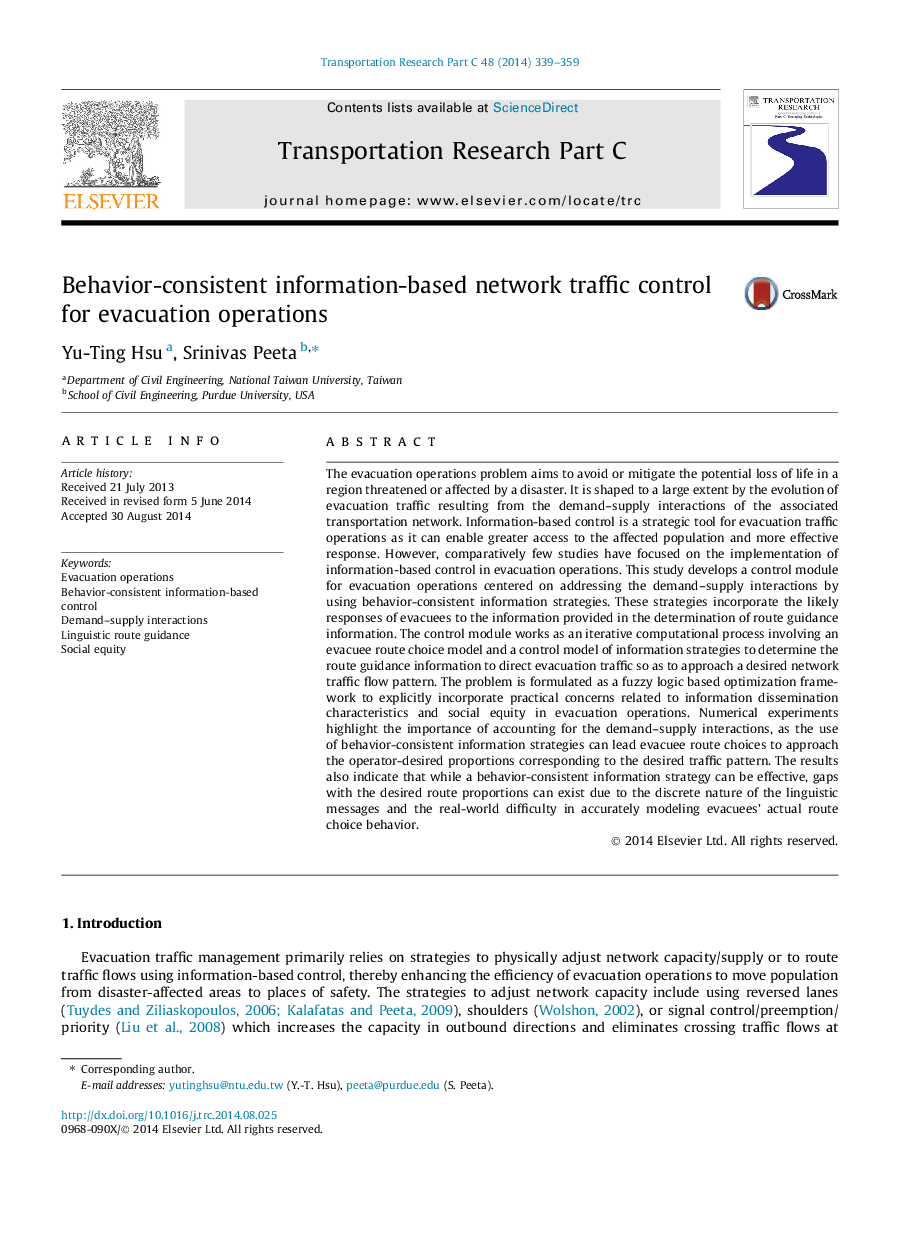| کد مقاله | کد نشریه | سال انتشار | مقاله انگلیسی | نسخه تمام متن |
|---|---|---|---|---|
| 6937010 | 868876 | 2014 | 21 صفحه PDF | دانلود رایگان |
عنوان انگلیسی مقاله ISI
Behavior-consistent information-based network traffic control for evacuation operations
ترجمه فارسی عنوان
کنترل ترافیک شبکه مبتنی بر اطلاعات رفتار برای عملیات تخلیه
دانلود مقاله + سفارش ترجمه
دانلود مقاله ISI انگلیسی
رایگان برای ایرانیان
کلمات کلیدی
عملیات تخلیه، کنترل رفتار مبتنی بر اطلاعات، تقاضا در تعاملات راهنمایی مسیر زبانی، عدالت اجتماعی،
ترجمه چکیده
مشکل عملیات تخلیه هدف این است که از تلفات بالقوه زندگی در یک منطقه تهدید و یا تحت تاثیر یک فاجعه جلوگیری یا کاهش یابد. این به میزان زیادی به وسیله تکامل ترافیک تخلیه ناشی از تقابل تقاضا و عرضه شبکه حمل و نقل مرتبط شکل گرفته است. کنترل مبتنی بر اطلاعات یک ابزار استراتژیک برای عملیات ترافیک تخلیه است زیرا می تواند دسترسی بیشتری به جمعیت آسیب دیده و واکنش مؤثرتر را فراهم کند. با این حال، مطالعات نسبتا کمی بر روی اجرای کنترل اطلاعات در عملیات تخلیه تمرکز کرده اند. این مطالعه یک ماژول کنترل برای عملیات تخلیه را با تمرکز بر تعاملات تقاضای عرضه با استفاده از استراتژی های اطلاعاتی سازگار با رفتار محسوب می کند. این استراتژی ها پاسخ احتمالی از تخلیه را به اطلاعات ارائه شده در تعیین اطلاعات هدایت مسیر می دهد. ماژول کنترل به عنوان یک فرایند محاسباتی تکراری شامل یک مدل انتخاب مسیر تخلیه و یک مدل کنترل از استراتژی های اطلاعات برای تعیین اطلاعات هدایت مسیر برای هدایت ترافیک تخلیه به منظور نزدیک شدن به یک الگوی جریان ترافیک مورد نظر شبکه. این مشکل به عنوان یک چارچوب بهینه سازی مبتنی بر منطق فازی تدوین شده است که به صراحت شامل نگرانی های عملی مربوط به ویژگی های انتشار اطلاعات و عدالت اجتماعی در عملیات تخلیه می شود. آزمایش های عددی، اهمیت حسابداری برای تعاملات تقاضا را برجسته می کنند، زیرا استفاده از استراتژی های اطلاعاتی سازگار با رفتار می تواند گزینه های مسیر تخلیه را برای رویکرد نسبت نسبت اپراتور مورد نظر به الگوی ترافیکی دلخواه منجر شود. نتایج همچنین نشان می دهد که در حالی که یک استراتژی اطلاعات سازگار با رفتار می تواند مؤثر باشد، شکاف هایی با نسبت مسیر دلخواه می تواند به دلیل ماهیت گسسته پیام های زبانی و دشواری دنیای واقعی در مدل دقیق رفتار واقعی انتخاب مسیرهای تخلیه وجود داشته باشد.
موضوعات مرتبط
مهندسی و علوم پایه
مهندسی کامپیوتر
نرم افزارهای علوم کامپیوتر
چکیده انگلیسی
The evacuation operations problem aims to avoid or mitigate the potential loss of life in a region threatened or affected by a disaster. It is shaped to a large extent by the evolution of evacuation traffic resulting from the demand-supply interactions of the associated transportation network. Information-based control is a strategic tool for evacuation traffic operations as it can enable greater access to the affected population and more effective response. However, comparatively few studies have focused on the implementation of information-based control in evacuation operations. This study develops a control module for evacuation operations centered on addressing the demand-supply interactions by using behavior-consistent information strategies. These strategies incorporate the likely responses of evacuees to the information provided in the determination of route guidance information. The control module works as an iterative computational process involving an evacuee route choice model and a control model of information strategies to determine the route guidance information to direct evacuation traffic so as to approach a desired network traffic flow pattern. The problem is formulated as a fuzzy logic based optimization framework to explicitly incorporate practical concerns related to information dissemination characteristics and social equity in evacuation operations. Numerical experiments highlight the importance of accounting for the demand-supply interactions, as the use of behavior-consistent information strategies can lead evacuee route choices to approach the operator-desired proportions corresponding to the desired traffic pattern. The results also indicate that while a behavior-consistent information strategy can be effective, gaps with the desired route proportions can exist due to the discrete nature of the linguistic messages and the real-world difficulty in accurately modeling evacuees' actual route choice behavior.
ناشر
Database: Elsevier - ScienceDirect (ساینس دایرکت)
Journal: Transportation Research Part C: Emerging Technologies - Volume 48, November 2014, Pages 339-359
Journal: Transportation Research Part C: Emerging Technologies - Volume 48, November 2014, Pages 339-359
نویسندگان
Yu-Ting Hsu, Srinivas Peeta,
